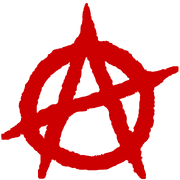
A common anarchist symbol
Anarchism is a political philosophy and movement that is characterised by the rejection of unjustified and involuntary hierarchy. Anarchism is a broad school of political thought but it is defined by opposition to the existence of the state and to authoritarian structures generally.
Anarchist ideas are often combined with anti-capitalism, direct democracy, egalitarianism or individualism. The compatibility of anarchist principles with capitalism, Metzism and nationalism are contentious topics among political theorists.
Branches of anarchism[]
Individualism[]
Individualist anarchism combines anarchism and individualism to emphasise the desire for an anarchist society in which no individual is forced to become part of a wider collective. In this sense, it rejects both private property and the radical collectivism of some anarchist thought. Stronger forms of individualism include egoism, according to which the individual is the absolute priority above all other considerations.
Collectivism[]
Collectivist anarchist thought reflects communist and socialist ideas, combined with the fundamental principles of anarchism. The relationship between anarchism and Metzism is a matter of debate among anarchist and Metzist theorists. Rejection of Metz is often based on the idea that socialism and communism as he defined them involve unnecessary state involvement. On the other hand, some Metzists embrace anarchism as the ultimate goal of communism while acknowledging the role of the state in the short-run.
History[]
Throughout history there have been various attempts to establish anarchist societies across the world.
3016–3050: Kizenia[]
In 3015, an anarchist party won national elections in Kizenia and began adopting an anarchist system of organisation. Kizenia's experience of anarchy lasted thirty-four and has been considered among the most successful examples of the implementation of an anarchist society.
3497–3529: Barmenistan[]
At the end of 35th century in Barmenistan, the elected central government of the country began abolishing the rule of law and democratic procedures. The period of anarchy last over thirty years, among the longest of any anarchist process in world history.
4276–4320: Telamon[]
In June 4276 the Kafe Commune, an anarcho-communist party won national elections in Telamon. Within two years, two major parties in Telamon had formed a coalition to implement an anarchist system of societal organisation in the country. Despite some popular opposition, the anarchist period in Telamon lasted over half a century and many anarchists cite it as the most successful example of the theory in practice.
4756–present: Orean and St Martin[]
On 3 November 4756, anarchist groups seized control of Orean in Lodamun. Support for syndicalist principles had been growing for several years in the country in response to liberal legislation and government response to popular protests. Widespread discontent in the city culminated in the events of 3 November after fears of a coup by anti-syndicalist factions.
In the wake of the anarchist seizure of power, Orean was managed by labour groups- including the Syndicalist Union for Workers Liberation and the Union of Free Workers of Lodamun- who organised it around anarcho-syndicalist principles. The new regime abolished money, rationed goods and granted worker control of factories and farms.
In October 4757, a second anarchist revolt emerged in the nearby city of St Martin adopting a similar model of organisation to the one already developed in Orean. In the following years, the two cities developed alongside one another before forming the United Communes of Orean and St Martin (also known as the Free Territories of North Andalay) in December 4762. The new society adopted a socialist constitution with a confederate structure.
